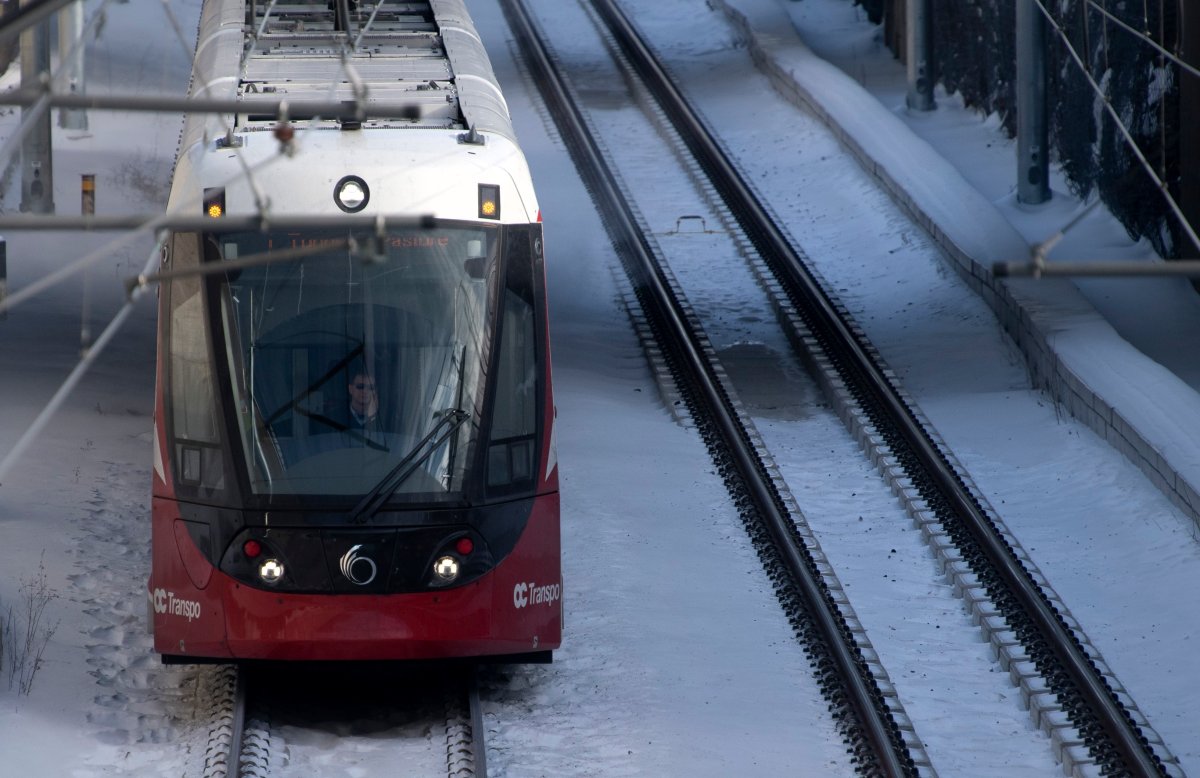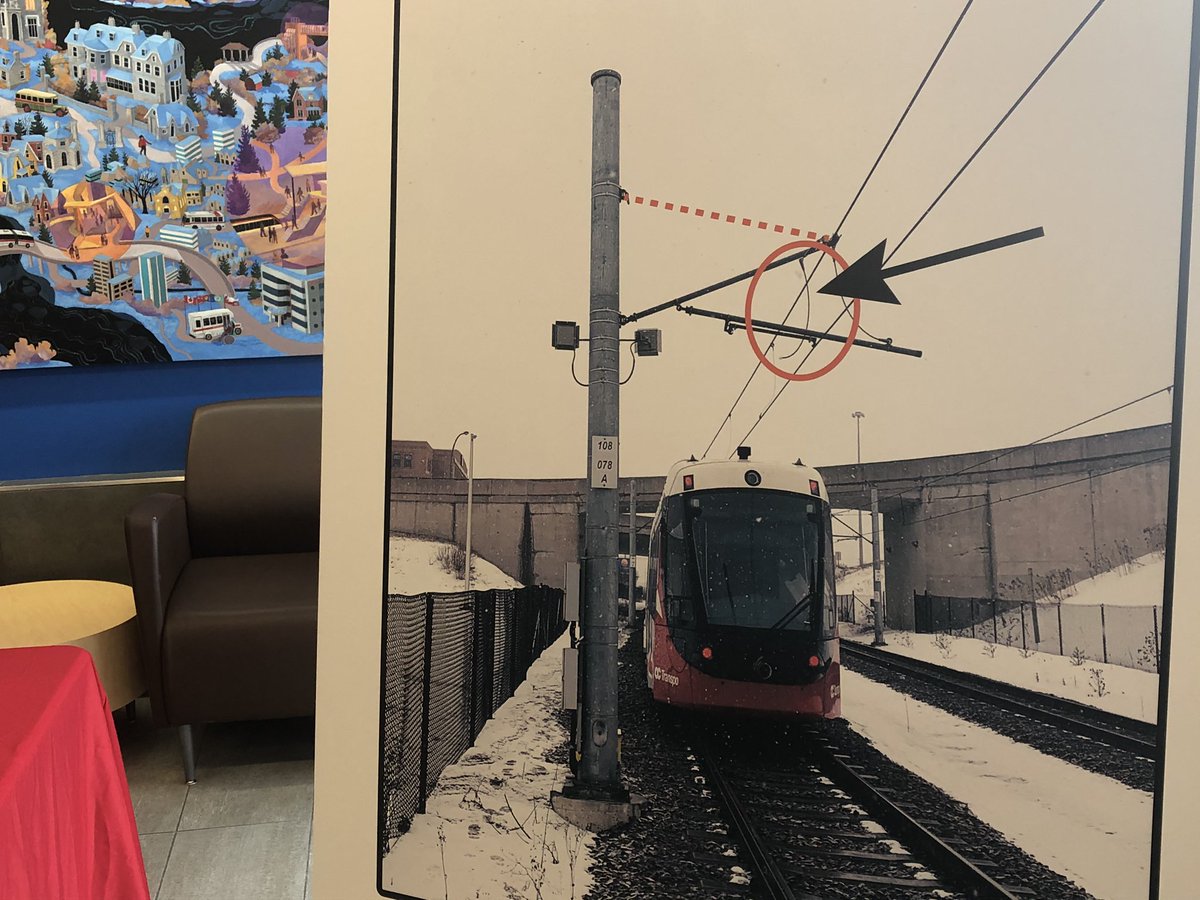Ottawa’s public transit agency is beefing up its bus service on Thursday to compensate for a serious train shortage on the light-rail Confederation Line during a heavy and messy snowfall.

As of about 3:15 p.m., OC Transpo said seven trains are in service, running every eight minutes during the afternoon rush hour. That’s instead of the 13 trains needed for peak travel periods and represents less than half of the 17 trains the city got with the LRT system.
The afternoon commute, however, kicked off with six trains – one of the lowest numbers reported since the train launched.
OC Transpo is running its supplementary bus service – which takes riders directly out of downtown to three major transfer stations – throughout the afternoon and evening, instead of just at rush hour.
Matching the train’s hours, dedicated replacement buses will also provide service parallel to the LRT system, taking riders end-to-end on the line and stopping at all train stations.
- Retired Quebec teacher buys winning lottery ticket at last minute, wins $40M
- N.B. election: Higgs went to ‘very dark place’ with Liberal joke, opponent says
- NDP want competition watchdog to probe potential rent-fixing by landlords
- Jasper mayor says CN Rail relocation will be devastating: ‘Deeply disappointed’
The bolstered bus service was implemented after only seven trains were in service for most of the morning commute.
Pat Scrimgeour, OC Transpo’s director of transit customer systems and planning, said late Thursday morning that the “augmented” bus service should be enough to meet lower rider demand on a snow day but he warned the train service will be “fragile.”
Timeline of newest LRT problems
A number of problems along the Confederation Line that began Wednesday afternoon have contributed to the current train shortage. LRT service was down between Blair and Hurdman stations for most of Wednesday night.
At around 4 p.m., a train operator noticed that a cable supporting the LRT’s overhead wire system had fallen near St-Laurent station. The operator stopped the train and passengers were evacuated out of the vehicle. A second train also stopped just east of Tremblay station because of the fallen cable issue and those riders had to be evacuated too.
Later in the evening, unrelated to the fallen cable, a train also lost power and stopped near uOttawa station and a door faulted on another train at Bayview station, causing further service hiccups.
End-to-end service was restored at 12:20 a.m. after crews repaired the fallen cable, according to OC Transpo. But Wednesday’s issues and an overnight “power issue” at the LRT maintenance and storage facility “challenged” vehicle availability going into Thursday morning, transit officials said at a press conference about the LRT issues.

Get daily National news
Only nine trains were launched on the Confederation Line early Thursday, officials said. Then, two had to get pulled out of service because they lost power and stopped on the tracks – one just east of the underground Rideau station, the second at Tremblay, all before 7 a.m.
Passengers on the stopped train near Rideau station had to be evacuated and escorted about 50 feet down the tracks back to the station, officials said.
“We don’t want evacuations. We don’t want to be having people walk on the tracks in the tunnel and so forth,” OC Transpo boss John Manconi said. “We’re not happy that we’re doing that. We rarely want to do that.”
The series of issues also caused uneven train spacing, longer wait times and some crowding at stations, transit staff said.
Fallen cable not weather-related, RTG says
At Thursday’s news conference, more details were provided about which broken cable paralyzed service on the line’s east end the day prior.
“One of the cables that holds the cantilever arms, and ultimately holds the power wire, came loose and broke,” said Troy Charter, OC Transpo’s director of transit operations.
Maintenance staff are investigating what caused the cable to fall down, said Peter Lauch, CEO of Rideau Transit Group (RTG), the consortium contracted to design, build and maintain the LRT system.
But the incident was not a hydro or power failure and didn’t occur because of the weather, Lauch told reporters.
The other power issues the trains are experiencing, however, do appear to be connected to a buildup of salt and dirt on the top of the trains, the city’s transit commission heard earlier this year.
“Electrical problems” with the equipment on the roof of the trains cause the vehicles’ circuit breakers to trip and these “arching” events appear to happen more often during wet weather.
RTG has said it’s working to clean that rooftop equipment more often. On Thursday, Lauch said the crews are working to cover all the trains’ rooftop inductors as a temporary fix.

So far, 19 of the 34-vehicle fleet have the protective covers and they’re getting installed on six more, Lauch said Thursday. (LRT vehicles are coupled together to make trains when they’re in service.)
“We will not send out another vehicle unless we have that protection in place,” Lauch said.
Finishing the job could take another eight to 10 days, he said.
Most of the trains that experienced major problems Wednesday and Thursday morning had to be pulled off the tracks for maintenance. Apart from those trains, others are undergoing heavy or scheduled regular maintenance, making them unavailable for service, according to Lauch.
RTG defends train model
Ottawa is the first city to use this particular version of Alstom’s low-floor Citadis Spirit train model. Problems with the trains, including door jams and other mechanical failures, were one of the reasons the project launched more than a year behind schedule last fall.
The ongoing problems have attracted attention from outside the capital from cities eyeing similar LRT systems, or, in the case of Metrolinx in the Toronto area, purchasing the same cars.
Some city councillors have called for the trains to be replaced with a more reliable model, but Lauch said despite the ongoing breakdowns, the trains are “good” and can provide service. Every time RTG develops a new solution to work around the issues, the train design is modified for new customers.
But he admitted that’s “cold comfort” for the train-riding public in Ottawa.
– With files from The Canadian Press









Comments